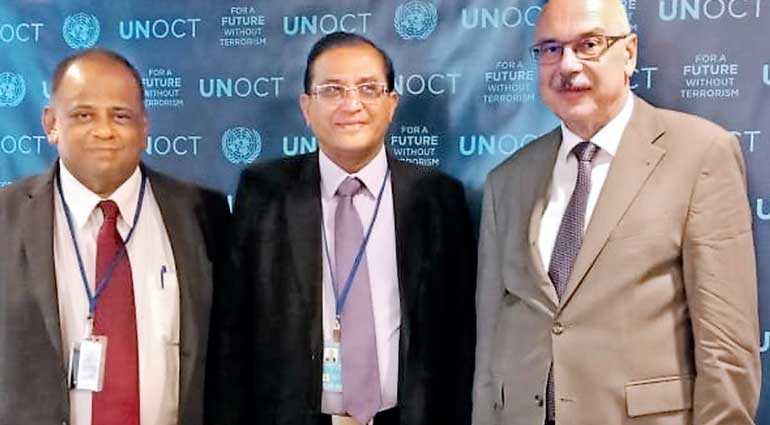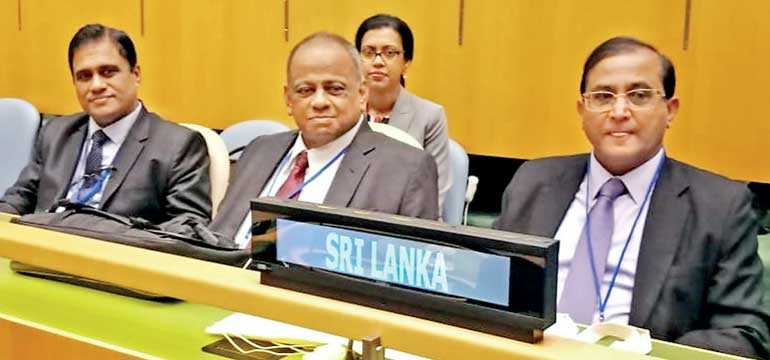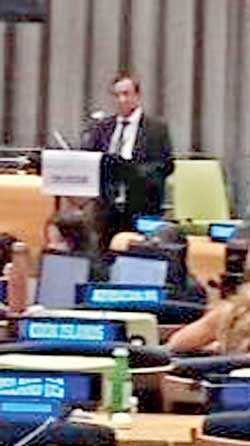Saturday Feb 21, 2026
Saturday Feb 21, 2026
Tuesday, 23 July 2019 00:52 - - {{hitsCtrl.values.hits}}


The High-Level Forum on sustainable development and the High Level Segment of Economic and Social Council (ECOSOC) meeting was held from 8 to 19 July at the United Nations (UN) Head Quarters in New York and this important event was attended by over 125 heads of states or their representatives and over 2,000 participants from countries with representative of development partners, academia and civil society representatives. The theme of the Forum for the year 2019 was on empowering people and ensuring inclusiveness and equality.
The Forum was chaired by UN Secretary General and other important international dignitaries and the inaugural session was held at the General Assembly. The 2030 Development Agenda sets out ambitious and transformative agenda to address the 21st century complex development challenges, said Ministry of National Policies, Economic Affairs, Resettlement and Rehabilitation, Northern Province Development and Youth Affairs Secretary V. Sivagnanasothy.
2030 Development Agenda
The 17 Sustainable Development Goals with 169 targets and 243 indicators have been agreed at the UN in 2015 with the participation of all partner countries. 17 goals include the salient goals such as no poverty, zero hunger, good health and wellbeing, quality education, gender equality, clean water and sanitation, affordable and clean energy, decent work and economic growth, industry, innovation and infrastructure, reduce inequalities, sustainable cities and communities, responsible consumption and production and climate action, life below water, life on land, peace, justice and strong institutions and global development partnership. Therefore, the SDGs focus on making the world and the countries a happiest pleasant and enjoyable place to live. 
Sri Lankan delegation
The Sri Lankan delegation was headed by Udaya R. Seneviratne, Secretary to the President and Chairman, Sustainable Development Council, and comprises of V. Sivagnanasothy, Secretary to Ministry of National Policies, Economic Affairs, Resettlement and Rehabilitation, Northern Province Development and Youth Affairs and member of the Sustainable Development Council and the Director General of the Sustainable Development Council Yalagama. The statement of the Head of Delegation stressed on the commitment by GOSL in terms of localisation and mainstreaming into the National Development Plan and incorporating into the national budget and ministerial program, interventions and at sub national level.
SDG principles:
The Forum emphasised the principals of ‘no one left behind’. This implies inclusive approach and mainstreaming gender and vulnerable groups such as differently abled, women-headed families, etc. Disaggregated statistical data is very important to ensure lagging regions are identified and policies and strategies are formulated to ensure ‘no one left behind’. The forum also paid special attention on peace, human rights, effective governance, rule of law and justice system. The need to focus on climate resilience policies and strategies have a very important aspect and the need to maintain global temperature within 1.5-degree Celsius was considered as important. As climate factors can adversely affect all the goals and as such the need to pay very special attention was emphasised by the partner countries.
With regard to financing SDGs, the need to mobilise private sector to achieve SDG Goals was discussed in addition to the domestic and external resources. The partner countries also stressed the trade-off between different goals where achievement of one goal may result in forgoing the achievement of other goals. For example, the use of coal power though contribute to economic growth may adversely affect the environmental sustainability. Similarly, rapid economic growth may create environmental problems over mining, water pollution, deforestation, and inequalities.
Therefore, as the goals are inter-dependent and inter-connected and inter-linked, they should not be seen in isolation but, seen in holistic approach of 2030 development agenda. As the 2030 development agenda is not just a government agenda but a national agenda, the Government, private sector, civil society and academia should work collaboratively to formulate policies, and strategies. As such partnerships are vital for effective achievement of SDGs.
The Head of the Sri Lanka delegation presented a statement which emphasised on the localisation of SDGs through the preparation of Sustainable Development: Vision and Strategic Path. The Government of Sri Lanka has taken action to integrate SDGs into the National Development Plan of Vision 2025. The National Planning Department under the Ministry of National Policies, Economic Affairs, Resettlement and Rehabilitation, Northern Province Development and Youth Affairs has revisited the project submission format and call for the submission of projects and programmes from the line ministries to meet the localised SDGs. The first VNR was submitted at the High Level Forum in 2018.
Localising and mainstreaming SDGs
The Sustainable Development Council is in the process of developing a SDG policy directive in consultation with all relevant ministries and stakeholders. The National Budget Department of the Ministry of Finance has issued a Budget Call requesting all line Ministries to submit projects and programmes aligned to the localised SDGs and National Development Plan. The need to support and strengthen national statistical system with disaggregated data is important to identify poverty pocket, gaps and formulate targeted interventions to ensure ‘no one left behind’.
Voluntary National Reviews (VNRs)
At the High-Level Forum of the ministerial segment, many countries (47 countries) presented Voluntary National Review (VNR) Report and presented the progress, achievement, slippages, roadblocks, constraints, lesson learnt and reformulation of new policies and strategies to achieve SDGs. The need to extend support through Official Development Assistance (ODA) to achieve SDGs was emphasised and the commitment to contribute 0.7% of Growth National Income (GNI) for official development assistance was also reiterated said Sivagnanasothy.
VNR Report is an innovative UN Process to follow-up on the adoption of development agenda. It is a country-led, county owned, transparent voluntary participatory review process with evidence-based information to assess the adoption of SDGs in a country context.
As a pilot initiative the UNDP has supported in a big way to develop SDG focused District Development Plans in all eight Northern and Eastern Districts. Hanaa Singer, UN Resident Coordinator and her team including UN Agencies have extended their support to implement the 2030 development agenda – sustainable development goals in Sri Lanka in localisation, mainstreaming, tracking and evaluation of initiatives.